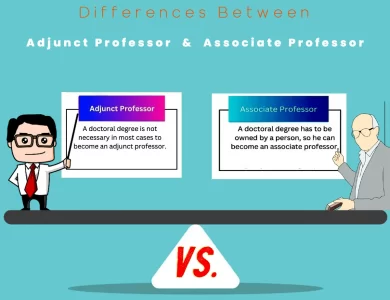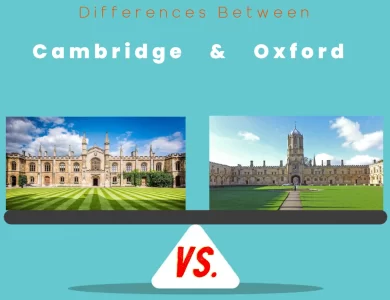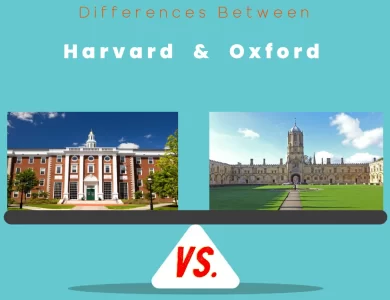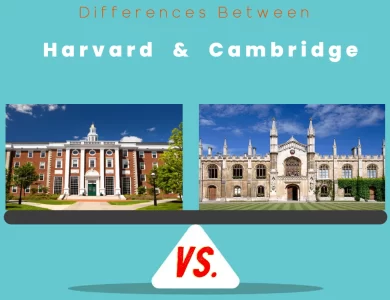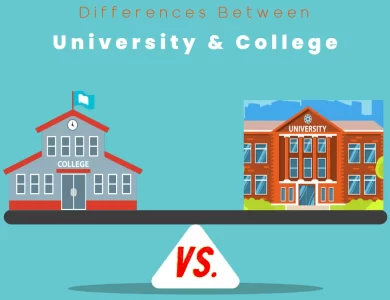University Education
Here, we delve deep into the myriad aspects that set apart various terms and other items related to this fascinating realm. Whether you’re a prospective student seeking clarity or an academic enthusiast thirsting for knowledge, this comprehensive guide is designed to provide you with valuable insights and answer your burning questions.
At universities, the path to knowledge is paved with unique terminologies and distinctive elements that may vary across institutions and countries. In this engaging collection of articles, we shed light on the key differences that shape the landscape of university education. From degrees and programs to grading systems and academic calendars, we leave no stone unturned as we uncover the nuances that make each university experience truly distinct.
-

Department vs Faculty
In the intricate tapestry of higher education, two essential components shape the academic landscape: Faculty and Department. These terms often appear interchangeable at first glance, but they serve unique roles and functions within the academic ecosystem. To make informed decisions about your academic path, it's crucial to understand the distinctions between these entities. Faculty, encompassing multiple academic departments, offers a holistic perspective on education and research. It encourages interdisciplinary collaboration and is led by a Dean, a high-level academic administrator. Faculties promote cross-disciplinary initiatives, making them an excellent choice for students exploring various academic interests. Departments, on the other hand, are specialized units dedicated to specific academic disciplines or fields. Led by a Department Chair, they prioritize in-depth knowledge and expertise within their particular area. If you have a clear major in mind and a passion for advancing knowledge in a specific discipline, aligning with a Department may be the way to go. Understanding the differences between Faculty and Department is vital for students selecting a major and faculty members considering their career paths. Whether your journey leads you to the interdisciplinary horizon of a Faculty or the specialized realm of a Department, these distinctions will guide your academic endeavors.
-

Associate Professor vs Adjunct
In the dynamic world of academia, the titles "Adjunct Professor" and "Associate Professor" represent two distinct yet vital roles, each offering unique opportunities and challenges. Understanding the differences between these positions is crucial for students curious about their educators' titles and aspiring academics charting their career paths. Adjunct Professors often take center stage in the classroom, bringing real-world expertise to their teaching roles. They are typically hired on a temporary or contractual basis, primarily focusing on course instruction. While some Adjuncts may engage in research, their main responsibility lies in delivering lectures, grading assignments, and nurturing the academic growth of students. Job security for Adjunct Professors tends to be limited, as their employment often depends on institutional needs and enrollment numbers. Associate Professors, on the other hand, occupy a more comprehensive and stable position within academia. This mid-level academic rank is usually associated with tenure-track positions. To reach this status, candidates must demonstrate a high level of expertise in their field through research, teaching, and service to the university. Associate Professors actively engage in research activities, publish scholarly works, and contribute to the academic community. The prospect of achieving tenure provides a significant level of job security in academia. Whether you're contemplating a career in higher education or simply curious about the roles that shape your academic journey, delving into the distinctions between Adjunct and Associate Professors unveils the fascinating world of academia's multifaceted terrain.
-

University vs TAFE
Curious about the choices between TAFE and University? This guide unpacks the fundamental differences to help you make an informed decision. TAFE (Technical and Further Education) and University offer distinct pathways, each catering to unique learning styles and career aspirations. TAFE excels in providing practical, hands-on training for vocational fields, equipping students with industry-specific skills. The shorter duration of TAFE courses appeals to those aiming for swift workforce entry. On the other hand, University offers a comprehensive academic experience, delving into theoretical knowledge, research skills, and critical thinking. The longer duration of university degrees allows for in-depth exploration of subjects and broader skill development. Entry requirements vary between the two, with TAFE often having more flexible criteria compared to structured prerequisites in universities. Financial considerations come into play too, with TAFE typically offering more budget-friendly options. Whether you envision a hands-on approach or desire academic depth, understanding the nuances between TAFE and University is pivotal to embarking on the right educational journey for your future.
-

Oxford vs Cambridge
Embarking on the journey of higher education brings you to a crossroads: Cambridge or Oxford? These two esteemed institutions, steeped in centuries of academic excellence, offer unique paths for your intellectual odyssey. Delve into the differences between Cambridge and Oxford, and discover the nuances that set them apart. Both universities emphasize rigorous academia, yet they employ distinct approaches. Cambridge leans towards specialization, allowing you to immerse yourself deeply in your chosen field through its tripos system. In contrast, Oxford offers flexibility, encouraging exploration across various subjects while maintaining a strong foundation in your major. The teaching styles at these universities also diverge—Cambridge's intense one-on-one tutorials versus Oxford's small-group discussions. Beyond academics, the campus atmospheres enchant with their own allure. Cambridge's idyllic charm and punting tradition contrast Oxford's vibrant blend of urban energy and rural beauty. As you consider your path, contemplate the application processes: Cambridge's subject-specific assessments versus Oxford's holistic evaluations. The choice is yours, and understanding these differences will illuminate the unique educational tapestries woven by Cambridge and Oxford.
-

Oxford vs Harvard
When it comes to selecting a world-class university, Harvard and Oxford stand tall, offering distinct educational experiences. Harvard University, nestled in Cambridge, Massachusetts, showcases a decentralized academic model with interdisciplinary research at its core. On the other side of the Atlantic, the University of Oxford, ensconced in the historic city of Oxford, England, follows a collegiate system with personalized tutorials that foster profound discussions and critical thinking. These institutions diverge not only in teaching methods but also in campus environments. Harvard thrives in an urban setting near Boston, providing access to industry connections and cultural events. Oxford, however, exudes a more classical ambiance, boasting centuries-old architecture and serene courtyards. This comparison extends to alumni networks; while Harvard's graduates span various industries, Oxford's alumni shine in academia, law, and politics. When pondering the decision between Harvard and Oxford, financial considerations come into play. Harvard's tuition fees are notable, but financial aid programs ensure accessibility. Oxford, too, offers scholarships and bursaries. With these factors in mind, prospective students can weigh the nuances and choose the university that aligns best with their educational aspirations and personal preferences.
-

Cambridge vs Harvard
Embarking on the journey to higher education, the choice between Harvard and Cambridge universities can be a pivotal moment. Rooted in rich histories and revered for their academic excellence, these institutions stand on either side of the Atlantic, each offering a unique tapestry of experiences. Harvard, nestled in the bustling city of Cambridge, Massachusetts, and Cambridge, situated in the historic charm of Cambridge, England, present distinct academic philosophies. Harvard embraces the liberal arts, encouraging students to explore diverse subjects before declaring a major. Meanwhile, Cambridge's specialized college system immerses students directly into their chosen disciplines. Teaching methodologies differ as well, with Harvard's interactive discussions contrasting Cambridge's lecture and supervision approach. Campus cultures reveal further nuances: Harvard's vibrant urban environment and diverse extracurriculars versus Cambridge's tradition-rich collegiate system. These institutions impact the global landscape through groundbreaking research and influential alumni networks. This guide delves into the heart of these differences, aiding aspirants in making an informed decision that aligns with their academic ambitions and personal values. Whether it's the historical legacy of Harvard or the timeless traditions of Cambridge, your choice will shape your intellectual journey and leave an indelible mark on your future.
-

University vs College
Are you feeling perplexed by the terms "university" and "college"? Do you find yourself wondering what sets them apart in the realm of higher education? Look no further! In this article, we unravel the distinctions between universities and colleges, shedding light on their academic programs, campus experiences, and more. Whether you're a student navigating the college application process or simply curious about the education landscape, join us on this enlightening journey as we explore the captivating differences between universities and colleges. Universities encompass a vast array of undergraduate and postgraduate programs across various disciplines. With an emphasis on research and innovation, universities often boast cutting-edge facilities and renowned faculty members who actively contribute to their fields. On the other hand, colleges typically specialize in undergraduate education, offering programs tailored to specific fields of study. These institutions often prioritize practical skills and career readiness, providing students with a more intimate and personalized learning environment. Beyond academic offerings, universities and colleges differ in campus size, faculty-student ratios, and the overall campus culture. Universities often feature sprawling campuses with diverse resources and extracurricular activities, fostering a vibrant and multicultural atmosphere. Meanwhile, colleges offer a tight-knit community where students benefit from smaller class sizes and closer interactions with professors. Join us on this educational voyage as we delve into the captivating realm of universities and colleges. Gain valuable insights to inform your educational journey and make an informed decision about your future.

